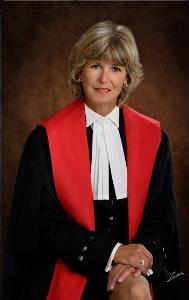 Court of Queen’s Bench of Alberta Justice Juliana Topolniski was a registered nurse before radically switching gears after taking a university business law course.
Court of Queen’s Bench of Alberta Justice Juliana Topolniski was a registered nurse before radically switching gears after taking a university business law course.
And the rest - following 19 years as a lawyer and nearly 18 years on the Bench - is, as they say, history.
“It has been an honour to have served the public as a member of this exceptional Court,” says Justice Topolniski, who officially retired on Dec. 30.
The Winnipeg native trained as an R.N. right after high school and, upon graduating at age 19, she turned down job offers in sunny climes for chilly Flin Flon, Manitoba, thinking she would learn there a lot faster. And that she did, as within months she became the head nurse of a 21-bed surgical unit. Not too long after that, she moved to Edmonton to work at the University of Alberta Hospital and return to school, obtaining her BScN at the U of A with a view to pursuing a Master’s degree in Health Administration.
But then she followed a professor’s suggestion and took a business law course.
“And that was that,” says Justice Topolniski, who was taken with the reasoning process in legal cases. She made the switch to law school, earning her LLB from the University of Alberta Faculty of Law in 1983. She articled with Lucas, Edwards & Bishop, now Davis LLP, and was admitted to the Alberta Bar in 1984.
With an eye on gaining courtroom experience, Justice Topolniski spent her early years in practice as junior counsel on complex commercial and civil matters, coupling that with a mixed caseload of family and criminal, including working with youth. However, she soon found her niche in commercial and insolvency law.
In 1988, she joined Bishop & McKenzie LLP and developed a practice focused almost entirely on insolvency and commercial litigation. She made partner in 1990 and spent 15 very enjoyable years with the firm.
During her legal career, Justice Topolniski was a Bencher of the Law Society of Alberta, serving on its Executive and chairing several committees. She was also a president of the Edmonton Bar Association, Chair of the Edmonton Insolvency Study Group, Bar Admission, CBA and LESA course instructor, guest lecturer at the U of A Faculty of Law and oral examiner for the Trustees’ in Bankruptcy licensing exams. Away from the practice of law, she was a director of the Edmonton Community Foundation and the Edmonton Chapter of the Multiple Sclerosis Society.
Justice Topolniski received a Queen’s Counsel designation in 2000 and was appointed to the Court of Queen’s Bench in 2003.
A recent virtual Swearing-Out Ceremony was attended by Supreme Court of Canada Justice Sheilah Martin, Court of Appeal and QB Justices, QB Masters, Court staff, family, and friends. Chief Justice of Alberta Catherine Fraser, QB Chief Justice Mary Moreau, Associate Chief Justice Ken Nielsen and Rick Reeson Q.C. spoke of Justice Topolniski’s important contributions in all areas of the law during her almost 18 years on the Bench.
Chief Justice Moreau summed it up by saying: “Juliana has left a legacy of carefully crafted, ground-breaking judgments. She also put the Court’s Commercial Group on the national map as Co-Chair of the committee from its inception until taking supernumerary status.”
Both Chiefs recalled her much-publicized 2016 reversal of a Provincial Court acquittal in a sexual assault case, where the trial judge had characterized the 15-year-old complainant's conduct as “ambiguous.” Justice Topolniski wrote:
“Consent means “Yes.” The word “No” does not mean “Yes.” The word “No” coupled with fending off an attacker with a water bottle does not mean “Yes.” There is nothing ambiguous about it.”
Chief Justice Moreau also noted that Justice Topolniski was not one to mince her words, citing the introduction to her written reasons setting aside a default judgment in 2018:
“In sharp contrast to the purpose statement espoused in Alberta’s foundational rules of civil procedure, this case illustrates how ineffective, costly and frustrating litigation can become when it is ‘plagued by procedural missteps,’ a breakdown of courtesy and communication between counsel and the fallout of an overburdened and short-staffed Court system.”
Although Justice Topolniski is reluctant to talk about individual cases, she says that being a judge made for a fascinating and enjoyable part of her life. “Every case involves the human story and has its unique interests. I was always stimulated by hard cases argued by skilled lawyers, helping juries perform their important work and bringing litigants to a peaceable resolution without the need for continued litigation.”
Justice Topolniski says that she is going to miss the people (staff, colleagues, lawyers and litigants) and the many challenges that judging presents.
So, what she will she do in retirement?
“Frankly, it is all a bit daunting,” she says. “I am hoping to fill the void with a mix of volunteering in our Vancouver Island and Mexico communities, traveling (once that becomes a reality again), gardening, golfing and enjoying activities either in, on or near the water.”
At her Swearing-Out Ceremony, Justice Topolniski summed up her thoughts on her time with the Court and the future.
“It has been a great honour to serve the public and a privilege to have performed that service on a Court that has incrementally become more diverse, more transparent, and more open to embracing change. This is a challenging and exciting time for the Court. Armed with its strong leadership and a vibrant corps, it is sure to flourish. You all mean a great deal to me and I already know just how much I will miss you. Looking ahead, I hope to go all in and live by what may well be the most notable words of the day: The best memories are made in flip flops. Here’s to you! And here’s to flip flops!”